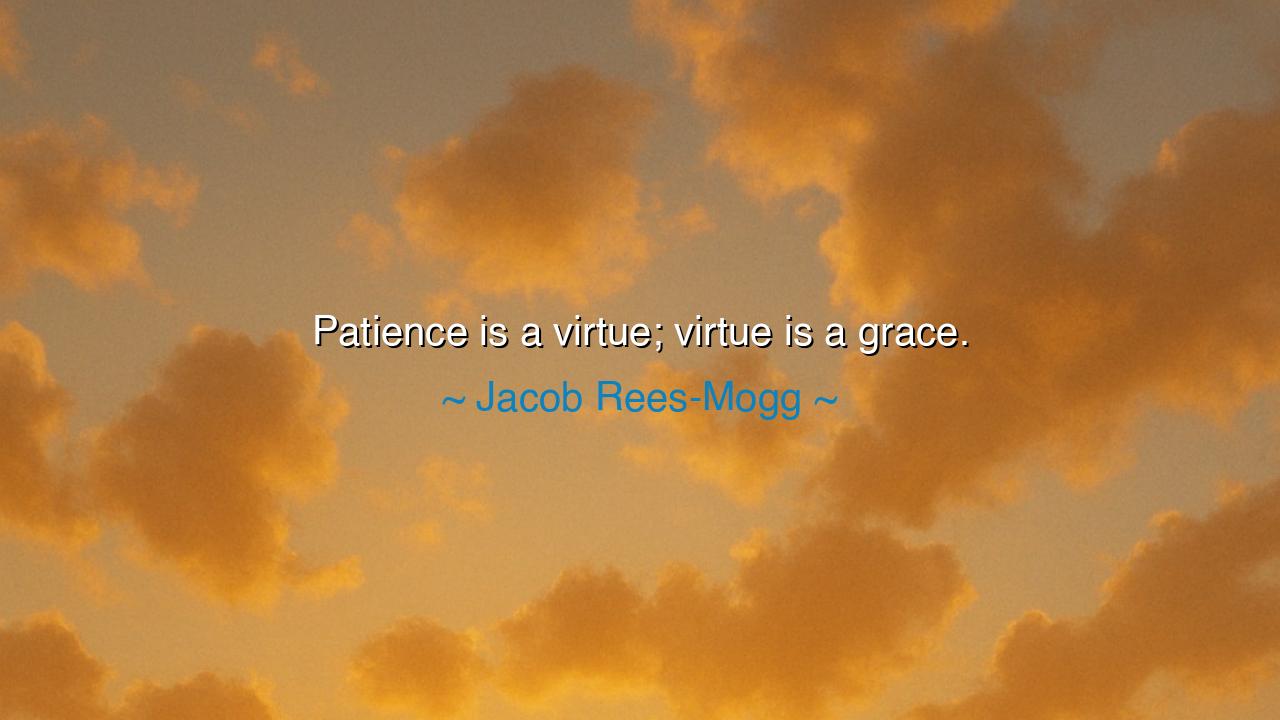
Patience is a virtue; virtue is a grace.






Hear the words of Jacob Rees-Mogg, echoing an ancient truth: “Patience is a virtue; virtue is a grace.” Though brief, these words carry the weight of centuries, for they are rooted in the wisdom of saints, philosophers, and elders who long ago discerned the bond between endurance, righteousness, and divine favor. In them we hear not only a moral teaching, but a map for the soul: that patience is the soil from which all good things grow, and that every virtue is itself a grace, freely given, to guide humanity toward higher living.
Patience is the discipline of time—the strength to endure trial without despair, to hold steady while others falter, to trust in the slow unfolding of destiny. Without patience, even courage withers into rashness, and love decays into demand. Patience is not passive; it is active waiting, a steadfastness of spirit that turns the storms of life into stepping stones of wisdom. This is why the ancients called it a virtue: for it is not easily won, but must be cultivated by discipline, humility, and perseverance.
Yet virtue itself, says Rees-Mogg, is also a grace. And here lies the deeper truth: virtue is not only the work of man but the gift of heaven. Grace is that divine favor which strengthens human weakness and lifts the soul beyond its own limits. To say that virtue is grace is to confess that even the best qualities of man—justice, temperance, patience, courage—are not born of pride, but are bestowed, nurtured, and sustained by something higher than ourselves.
History speaks with clarity on this matter. Think of the early Christians under Rome, who faced persecution with unwavering patience. They endured prison, mockery, and even death, not with hatred, but with steadfast faith. Their patience was their virtue, but it was also their grace, for it carried them beyond the natural bounds of endurance. In time, the empire that crushed them bent its knee to the faith they embodied. Thus, the marriage of patience, virtue, and grace reshaped history itself.
Or recall the long struggle of Nelson Mandela. Imprisoned for decades, he could have grown bitter, consumed by anger. But through patience, he emerged not with vengeance, but with forgiveness. This patience became his greatest virtue, and it carried the grace of reconciliation, healing a nation torn by injustice. His life reminds us that virtue alone may be admired, but when infused with grace, it becomes transformative, altering not only the one who practices it, but all who witness it.
The lesson is clear: patience is not merely a habit of waiting, but the very foundation of virtue. And every virtue is more than human achievement—it is touched with grace, a reminder that we are part of something greater than ourselves. To be patient is to acknowledge that time is not ours to command, but to trust in the unfolding wisdom of life. To be virtuous is to accept the gift of grace, and to use it for the good of others.
Practical wisdom stands before you: practice patience in the small things, so that you may be strong in the great trials. When anger tempts you, wait before speaking. When desire urges haste, pause before acting. When despair whispers, hold firm in hope. In this way, you cultivate virtue. And in all your striving, remember that virtue is not pride’s possession, but grace’s gift—so walk humbly, knowing that your strength is never yours alone.
So let Rees-Mogg’s words echo as a timeless chant: “Patience is a virtue; virtue is a grace.” Take them into your heart, live them in your deeds, and pass them to those who come after. For in patience lies strength, in virtue lies honor, and in grace lies the eternal touch that lifts mortal lives into immortality.






AAdministratorAdministrator
Welcome, honored guests. Please leave a comment, we will respond soon